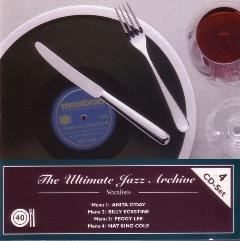The Ultimate Jazz Archive Vol.157 – Anita O’Day [1940-1945] [2005]
The Ultimate Jazz Archive Vol.157 – Anita O’Day [1940-1945] [2005]

01.Deep In the Blues 02.Let Me Off Uptown 03.Just a Little Bit South Of North Carolina 04.Slow Down 05.Georgia Of My Mind 06.Green Eyes 07.Kick It 08.Bolero At The Savoy 09.The Walls Keep Talking 10.Stop, the Red Light’s On 11.That’s What You Think 12.Massachusetts 13.I’m Going Mad For a Pad 14.’Murder’ He Says 15.Gotta Be Gettin’ 16.And Her Tears Flowed Like Wine 17.Are You Livin’ Old Man 18.Travelin’ Man 19.I Want a Grown-Up Man 20.Boogie Blues 21.Chickery Chick 22.Tea For Two 23.Opus 1
Anita O'Day was never just another big-band canary. That's not to say that she lacked the physical attributes to compete with the other Swing era vocalists — frilly eye candy occasionally taking the microphone to offer jaunty riffs on the latest pop tunes — who sat on stage with the Glenn Miller, Benny Goodman and Harry James ensembles.
There's a photo of O'Day on the cover of her autobiography, "High Times, Hard Times," in which she is perched, nylon-clad legs crossed, on top of a piano in a pose that could have been an inspiration for Michelle Pfeiffer's sexy lounge singer in "The Fabulous Baker Boys." The elegance was always a veneer covering an inner toughness, the hard life lessons learned that made her a superb jazz singer, one of the best of her generation — or of any generation. At a time when most female vocalists tended to emphasize the sweet timbres of their voice, she chose to follow a path blazed by the one major jazz singer who emphasized message over medium — Billie Holiday.
Like Holiday, O'Day combined the soaring freedom of a jazz instrumentalist with the storytelling lyricism of a poet. She often said she was a "stylist," not a "singer," which was correct, but only in a minimal sense.
From the moment she broke through to a national audience via the briskly swinging encounter with trumpeter Roy Eldridge in the Gene Krupa Band's recording of "Let Me Off Uptown" to her splendid Verve recordings of the '50s, and her comebacks in the '70s and again in the '90s, she was instantly recognizable, an utter original. Yes, "stylist," but much more. Like Frank Sinatra, she balanced the rhythmic songs that were generally considered to be her forte with an approach to ballads that varied from seductive intimacy to sardonic irony.
When I wrote about her in 1990, she was as feisty as ever, personally — discussing another hard-luck encounter with the vagaries of the record business — and still singing with the killer phrasing that made every song an adventure. Eight years later, I reviewed her again, this time after she had made an astonishing return to singing after a near-fatal encounter with pneumonia and blood poisoning. And again she was remarkable, as she was in her final performances before her death — to the very end, never just another big-band canary. --- Don Heckman, anitaodaydoc.com
download: uploaded yandex 4shared mediafire solidfiles mega filecloudio nornar ziddu








